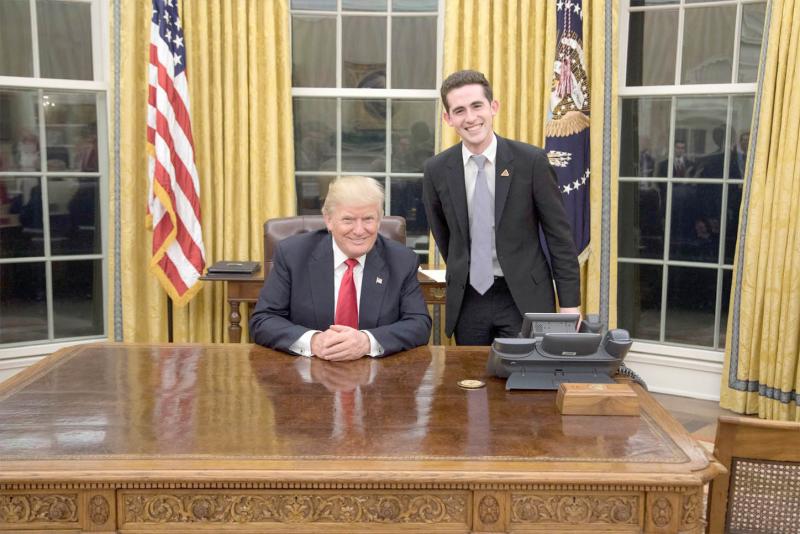Israeli prime minister’s unilateralism is informed by Trump’s style

Impractical approach. US President Donald Trump (L) and his new Middle East peace envoy Avi Berkowitz. (Twitter)
With Berkowitz, Trump is replacing the unqualified architect of a widely panned peace plan with someone even worse.
Those who wonder whether Israeli Prime Minister Binyamin Netanyahu will follow through on his audacious proposal to annex the Jordan Valley and the northern Dead Sea, as well as parts of the West Bank, need only look east and then west.
East, to India, where Hindu nationalist Prime Minister Narendra Modi made the breathtakingly bold decision to unilaterally downgrade the constitutionally recognised special status of the disputed territory of Kashmir. As of August 5, Kashmir has become a federally administered region of India; its state flag consigned to the museum of lost objects and its people subject to a security lockdown as well as drastic restrictions on communicating with the wider world.
West, from where Netanyahu is campaigning for the September 17 Israeli election, are the United States and the Israeli prime minister’s unabashed supporter US President Donald Trump.
It is in the person of this US president that East and West gloriously meet, at least from Netanyahu’s perspective. After Modi’s decisive action on Kashmir, Trump responded: The Indian leader feels he has the situation “under control.” The hands-off US approach to unilateral action on a disputed territory must surely be reassuring for Netanyahu. It leaves open the possibility that any Israeli move to annex almost 30% of the West Bank will not be resisted by the Trump administration.
Even without Kashmir-grab as a template, it has become increasingly apparent that Trump is not minded to censor Israeli unilateralism towards disputed territories. In fact, he has pushed the process along. In December 2017, Trump recognised Jerusalem as the capital of Israel and moved the US embassy there, taking the holy city off the table in final-status negotiations. The Palestinians claim East Jerusalem as the capital of their hoped-for state in the West Bank and Gaza.
Trump also recognised Israeli sovereignty over the Golan Heights, breaking from the post-WWII international consensus that forbids territorial conquest during war. Israel captured the plateau from Syria during the 1967 war.
In March, when Trump made his gift of the Golan Heights to Netanyahu — as if it were his to give — the Israeli prime minister faced a tight election battle. Now, Netanyahu is back fighting for his political life in Israel’s second vote in six months.
The possibility of Trump’s backing on crude electoral stunts and bold measures afterward matters hugely. Annexation of West Bank territory increasingly enjoys popular support in Israel. A poll by the Israel Democracy Institute in August indicated that 48% of Jewish Israelis asked said they were in favour if supported by the Trump administration. Benny Gantz, Netanyahu’s rival and head of the main opposition Blue and White alliance, said it had been his grand idea all along.
Clearly, Trump’s somewhat casual attitude to agreed international principles — on conflict, disputed regions, unilateral action — are central to developments in disparate parts of the world. Add to that this US administration’s frivolous approach to the Palestinian-Israeli conflict as a whole. Can there be anything more derisory than Trump’s announcement that his new Middle East peace envoy will be 30-year-old Avi Berkowitz?
Berkowitz is a former aide to the US president’s son-in-law Jared Kushner. His role was once described by former White House Communications Director Hope Hicks as “primarily administrative and involved assisting Kushner with daily logistics like getting coffee or coordinating meetings.”
Berkowitz has no experience of international problem-solving and no discernible expertise on the Middle East other than one that might be a liability. He is a Zionist Jew, who spent a couple of years studying at an Israeli secondary school where the focus was traditional religious texts.
Berkowitz aside, how committed is Trump to the mirage he advertised as the Deal of the Century? Jason Greenblatt, the man Berkowitz is replacing, was Trump’s real estate lawyer, a greenhorn diplomat who damningly announced his departure before the full Trump plan was rolled out. As US President Barack Obama’s Special Envoy for Israeli-Palestinian Negotiations Martin Indyk has said, with Berkowitz, Trump is replacing the unqualified architect of a widely panned peace plan with someone even worse.
What’s clear is that Trump likes the theatrics of peace-making but not the logistics, the detail and the emotional subtext of the politics on all sides.
We’ve seen this time after time in the past three years. Trump’s love of grand personal gestures has fallen short with Afghanistan, North Korea and China. The pattern is clear: North Korea talks are stalled; the part-reveal of the Middle East peace plan was a non-event. Few are setting much store by the second instalment, due right after the Israeli elections.
The art of the deal seems still to elude Trump. Thus far, the number of just and sustainable deals he’s done for the United States — or anyone else — can be reduced to a single number. Zero.
Originally published in The Arab Weekly

